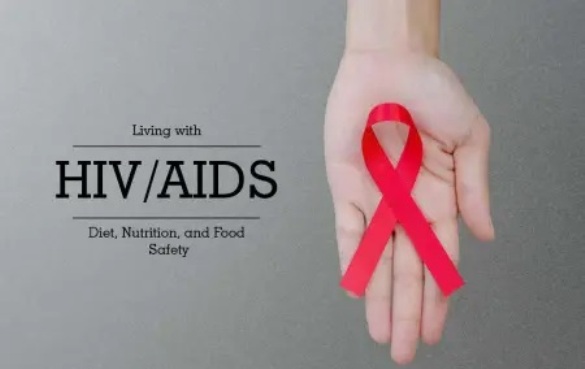HIV and Nutrition and Food Safety

- In people with HIV, good nutrition supports overall health and helps maintain the immune system. Good nutrition also helps people with HIV maintain a healthy weight and absorb HIV medicines.
- HIV and HIV medicines can sometimes cause nutrition-related problems. For example, HIV-related infections can make it hard to eat or swallow.
- Food and water can be contaminated with germs that cause illnesses. Food safety refers to ways to handle, prepare, and store food to prevent foodborne illnesses (sometimes called food poisoning).
- Because HIV damages the immune system, foodborne illnesses are likely to be more serious and last longer in people with HIV than in people with a healthy immune system.
- People with HIV should take the following steps to prevent foodborne illnesses:
- Wash hands, cooking utensils, and countertops often when preparing foods.
- Keep raw meat, poultry, seafood, and eggs separate from foods that are ready to eat, including fruits, vegetables, and breads.
- Cook food to safe temperatures.
- Refrigerate or freeze foods to prevent spoiling.
What is nutrition?
Nutrition refers to the food we eat to grow and stay healthy. Nutrition also includes all the body processes involved in making and using energy from food (called metabolism).
Why is good nutrition important for people living with HIV?
HIV attacks and destroys the immune system, which makes it harder for the body to fight off infections. Daily use of HIV medicines (called antiretroviral therapy or ART) prevents HIV from destroying the immune system. But a healthy diet also helps strengthen the immune system and keep people with HIV healthy.
What is a healthy diet for people living with HIV?
- Eat a variety of foods from the five food groups: fruits, vegetables, grains, protein foods, and dairy.
- Eat the right amount of food to maintain a healthy weight.
- Choose foods low in saturated fat (found in animal products such as fatty meats, whole milk, and butter), sodium (salt), and added sugars.
To learn more about how to maintain a healthy diet, visit the U.S. Department of Agriculture’s (USDA’s) ChooseMyPlate.gov website.
What are some HIV-related nutrition problems?
- HIV-related infections can make it hard to eat or swallow.
- Changes in the body's metabolism.
- Side effects from HIV medicines such as loss of appetite, nausea, or diarrhea can make it hard to stick to an HIV regimen.
If you have HIV and are having a nutrition-related problem, talk to your health care provider. Your health care provider can help resolve the issue.
To avoid nutrition-related problems, people with HIV must also pay attention to food safety.
What is food safety?
Why is food safety important for people living with HIV?
Following food safety guidelines reduces the risk of foodborne illnesses.
What steps can people with HIV take to prevent foodborne illnesses?
Don’t eat or drink the following foods:
- Raw eggs, for example, in some mayonnaises or uncooked cookie batter
- Raw or undercooked poultry, meat, and seafood (especially raw shellfish)
- Unpasteurized milk or dairy products and fruit juices
- Raw seed sprouts, such as alfalfa sprouts
Contaminated water can also cause illness. To be safe, never drink water directly from a lake or river and don’t swallow water when you're swimming.
It is important to be careful about what you eat or drink if you are traveling outside of the United States, especially in developing countries. Before your trip, read this fact sheet for people living with HIV who are traveling outside the United States from the Centers for Disease Control and Prevention (CDC).
Follow the four basic steps to food safety: clean, separate, cook, and chill.
- Clean: Wash your hands, cooking utensils, and countertops often when preparing foods.
- Separate: Separate foods to prevent the spread of any germs from one food to another. For example, keep raw meat, poultry, seafood, and eggs separate from foods that are ready to eat, including fruits, vegetables, and breads.
- Cook: Use a food thermometer to make sure that foods are cooked to safe temperatures.
- Chill: Refrigerate or freeze meat, poultry, eggs, seafood, or other foods that are likely to spoil within 2 hours of cooking or purchasing.

For more information, visit the U.S. Food and Drug Administration’s (FDA’s) Food Safety for People with HIV/AIDS webpage. The webpage includes information on the recommended safe minimum internal temperatures for cooked foods, tips for eating in restaurants, and steps to take if you think you have food poisoning.
This fact sheet is based on information from the following sources:
From the Health Resources and Services Administration (HRSA):From CDC:
From the U.S. Department of Veterans Affairs: From FDA:
From USDA:
This health news has been brought to you by the publishers of Health Reviews, Tips and News Website. Visit today for great health tips and reviews.



No comments
Post a Comment